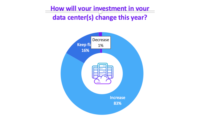Data centers are no longer just a critical component of the technology industry; they have become the backbone of nearly every aspect of our daily lives. And, as we increasingly rely on data-driven technologies, the demand for more facilities continues to surge. This presents a formidable challenge though — how can data center owners and operators balance the need for rapid expansion with the pursuit of greater efficiency, scalability, and sustainability? Compounding this challenge is the fact that data centers are among the world's most energy-intensive buildings. The quest for optimized, eco-friendly solutions is more urgent now than ever, and since AI can revolutionize data center operations in ways that exceed what we could ever do manually, it’s time to embrace the transformative benefits this technology has to offer.
A new approach
Oftentimes, data center operators are left in the dark, with outdated and irrelevant information about the facility they’re responsible for. That’s because design, build, and operations teams typically function in silos. The data center is essentially handed off like a baton in a relay race between the designer, builder, commissioner, QA/QC inspector, and operator. This fragmented approach leads to incomplete and inconsistent documentation and inefficient processes that cause operational errors. What it comes down to is this: The industry is suffering from a profound lack of institutional knowledge that must be addressed. That’s where Salute comes in.
Our proven processes and procedures dismantle the silos that isolate data center designers, builders, and operators. Our team of experts provides consulting on design and build procedures, performs commissioning and QA/QC processes, and manages ongoing facility operations. And, more importantly, we document the entire process, thereby retaining the institutional knowledge that’s typically lost when one team handoffs to the next.
Here’s how.
Salute Technology Enabled Program
Salute assembled a reference library, comprising a comprehensive collection of more than 175 standard operating procedures (SOPs), policies, and templates, that enables frontline personnel to operate mission-critical environments in a highly disciplined, efficient, and compliant manner. This playbook can be easily adapted to ensure custom-tailored solutions for site-specific environments.
Building on years of successful client engagements, the team set out to formalize and productize their solution. After presenting it to Lee Kirby, chairman, Salute, for feedback, he coined the name STEP, which stands for Salute Technology Enabled Program.
“The name just came to me,” he said. “I was looking at how the program combines years of operational best practices with the latest technologies, and I saw a solution — one that would allow our customers to STEP up to the challenges of AI operations.”
STEP is anchored by three core pillars that leverage AI to enhance operational readiness, standardize operations, and optimize performance.
The first pillar, operational readiness, is grounded in the playbook's structured guidance on governance, mission-critical facility operations, environmental health and safety, physical security, IT service management, and workforce development.
The second pillar, standardized operations, incorporates a technology platform that was purpose-built to enhance data center efficiency, reliability, and compliance. It provides integrated asset management, incident reporting, rounds monitoring, preventative maintenance, reliability benchmarking, and advanced analytics. Unlike traditional DCIM, EAM, and CMMS systems, this platform focuses on reducing capital and operational expenses while improving staff productivity and regulatory compliance.
The third pillar, optimized performance, utilizes an ISO27001-, GDPR-, and SOC2-certified software program designed to deliver significant improvements in plant stability, energy efficiency, and sustainability. This closed-loop AI control service continuously monitors, analyzes, and adjusts processes and systems in real time to achieve optimal performance. It’s essentially a virtual plant operator, employing AI co-pilots to assist on-site staff in managing power usage effectiveness (PUE), reducing CO2 emissions, and minimizing unplanned downtime.
STEP technologies
STEP is a foundational template for data center operations program routines that can seamlessly incorporate various advanced systems to achieve its objectives. The benefits include:
- Highly disciplined operations — This program is primarily focused on operating and protecting a mission-critical facility by utilizing on-site, dedicated personnel that self-perform the majority of facility management and maintenance tasks.
- Lower total cost of ownership (TCO) — Proactive and preventative optimization naturally drives down costs for unplanned corrective maintenance and premature equipment failure.
- Resiliency — A site-specific playbook improves triage, stabilization, and resolution capabilities, enhancing emergency preparedness and response.
- Compliance — This approach ensures facilities meet or exceed environmental, regulatory, and industry standards.
The ideal mix of technologies integrates essential systems, like our mission-critical facilities management platform for standardized operations and AI-driven software for optimization, along with additional tools based on the client’s specific needs and budget constraints.
New builds and existing sites
When applying STEP to new data center builds, integration is more straightforward because the program requirements can be incorporated from the start. By using our standardized platform from the commissioning stage all the way through to steady-state operations, Salute can capture a detailed digital twin of all client facilities and assets. This allows for seamless integration of all technologies, ensures the facility is optimized for efficiency and compliance from day one, and enables clean data control over the entire life cycle.
For existing sites, STEP can be implemented by integrating with current technologies and gradually evolving them to include advanced AI-driven systems. This transition involves aligning existing operations with STEP’s playbook and leveraging our operations platform and optimization software to enhance performance. Over time, existing technologies can be upgraded or replaced to fully realize the benefits of the STEP program.
Resolving issues with STEP
Data centers that lack a robust playbook or advanced analytics face significant operational challenges that could be mitigated with STEP. Each pillar of our program addresses specific, real-life issues that occur.
- Operational readiness — Without a playbook, new entrants in the industry, especially those backed by private equity, often cannot secure a tenant. Additionally, existing data center owners find it difficult to scale beyond a couple of sites without a documentation library that provides disciplined and efficient operational procedures, policies, and templates.
- Standardized operations — When unidentified and undocumented assets exist, life cycle planning is incomplete and planned maintenance can result in unintended consequences, including costly downtime. Furthermore, without a tracking system, issues found during rounds and readings remain unaddressed and SLAs are missed.
- Optimized operations — Data center optimization requires a highly granular approach; using industry-defined best practices simply doesn’t cut it anymore. But analyzing site-specific data requires a lot of time and expertise, not to mention it can be extremely overwhelming. AI algorithms, however, can process vast amounts of data in real time to detect patterns and anomalies with a level of speed and precision that far surpasses human capabilities. Data center operators who fail to integrate AI-driven solutions are not only missing out on significant opportunities to improve efficiency but are also exposing their facilities and equipment to unnecessary risks.
Real-life scenarios underscore the urgency of adopting such advanced programs. Recent incidents have highlighted the critical need for comprehensive SOPs and cutting-edge monitoring systems to prevent costly downtime and ensure continuity.
Conclusion
Implementing STEP not only addresses current operational challenges but also positions data centers to thrive in an increasingly complex and data-driven world.
Embracing an AI-enabled approach ensures facilities are well-equipped to handle growing demands, maintain high standards of efficiency, and stay at the forefront of technological advancements.
It’s never too early to plan ahead. Contact Salute now to take your first “STEP” toward an optimized future today.





